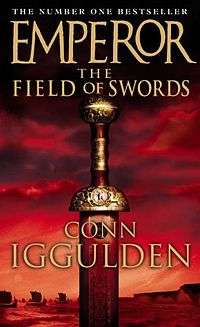The Field of Swords
|
The Field of Swords first edition cover. | |
| Author | Conn Iggulden |
|---|---|
| Original title | translator = |
| Country | United Kingdom |
| Language | English |
| Subject | Julius Caesar |
| Genre | Historical novel |
| Publisher | HarperCollins |
Publication date | 3 January 2005 |
| Media type | Print (Hardback & Paperback) |
| Pages | 588 pp (first edition) |
| ISBN | 0-00-713693-5 |
| OCLC | 59183857 |
The Field of Swords is the third novel in the Emperor series, written by British author Conn Iggulden. The series is historical fiction following the life of Julius Caesar.
The book was released in the UK on 3 January 2005 and published by HarperCollins. The story follows Julius Caesar from his position as Governor in Spain, through the Gallic Wars, the invasion of Britannia, the defeat of Vercingetorix, and eventually crossing of the Rubicon signalling the beginning of the Roman Civil War.
Plot summary
Having defeated Spartacus in The Death of Kings, Caesar is serving a five-year term as Governor Of Spain (Hispania Ulterior) with his Tenth legion. Depressed with guilt still over the death of his wife in The Death of Kings, he has exhausted himself in conquering and expanding Spain. However, when his friend Marcus Brutus' mother (Servilia) arrives, she engages in a romance with him and re-awakens his desire for power.
Before his term ends he deserts his Governorship (a serious crime amongst Roman patricians) to challenge for the role of Consul. With the help of current Consul Crassus he manages, yet only just and by getting himself into unbelievable levels of debt (and by defeating a rebel army on the verge of attacking Rome), to obtain the rank. To allow himself unprecedented military control of a province after his first six months as Consul, Caesar forms the First Triumvirate with Crassus and Pompey, the old Consuls.
After six months fulfilling promises he made during the election campaign, Caesar takes his Tenth Legion, the Third Gallica (formed from the mercenary survivors) and four other legions from northern Italy to a small outpost in Gaul. Caeser publicly presents his invasion as a necessary preemptive and defensive action, but he is primarily concerned with boosting his own political career and reputation (and plundering the wealthy Gallic territories to pay off his massive debts).
While he is fighting in Gaul, Rome is sliding towards strife as two new senators, Clodius and Milo, attempt to wrest control of the city from each other with their gangs, by terrorizing and fighting in the city. On a final night, the Curia is destroyed and both are killed by each other and Pompeys legion. After this night, Pompey declares himself Dictator and begins his dominion of the city. Meanwhile, Crassus is killed fighting with his legions in Parthia, leaving Pompey sole master.
After ten years of fighting, two expeditions to Britain, one million Gauls killed and another million sold into slavery, Caesar must make possibly the most important decision of his life. Does he return to Rome alone, as ordered by the Dictator Pompey, where his only military rival will most likely kill him, or plunge the Roman world into a civil war and see whether he survives. With a night of soul-searching on the Rubicon riverbanks, Caesar utters the words "The die is cast" (alea iacta est in Latin) and heads south to Rome with his legions.
Historical inaccuracies
Caesar did not stop the forces of the Catiline Conspiracy. In fact Caesar argued in the senate for reduced sentences for the offenders and was even suspected of involvement in the action (though Marcus Tullius Cicero lacked direct evidence). Caesar did not lead the troops against Catiline's army. Catiline was defeated by two separate Roman armies under Quintus Caecilius Metellus Celer and Antonius Hybrida. Also Pompey was not even in Rome at the time.
